DENTAL IMPLANTS
Treatment Options
There are several treatment options for replacing missing teeth, including tooth-supported bridges, partials, dentures, and dental implant-supported replacement teeth. Dental implants are standard of care and are considered the preferred option for replacing teeth due to the unique benefits of preserving both the bone and the surrounding teeth.
Some of the advantages of dental implants compared to other treatment options include:
- Implant crowns look, feel and function like natural teeth.
- Dental implants prevent bone resorption/deterioration.
- There is no need to cut down the adjacent teeth to replace one tooth.
- Dental implants have a much better long-term success rate.
- Dental implants restore the appearance of a natural-looking smile.
- An implant crown is much easier to clean than a traditional bridge.
- Implant replacement teeth are more stable than partials and dentures.
- Natural biting and chewing capacity is restored with dental implants.
- The discomfort of traditional dentures is eliminated with dental implants.
Dental implants can be used to replace a single missing tooth, multiple missing teeth, or all of the teeth.
Replacing a Single Missing Tooth
Whether you are facing impending tooth loss, or already missing a tooth, the ideal treatment option is an implant-supported crown. This will provide the most natural tooth replacement possible, with the best long-term esthetics and the best long-term success. This will also provide you with the most cost effective solution.
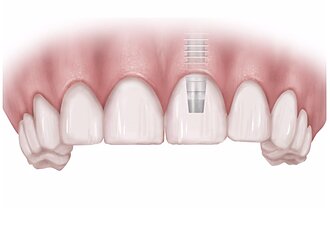
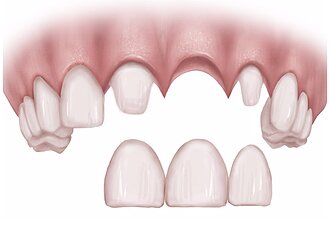
Replacing Multiple Missing Teeth
If you have a few or several missing teeth, multiple implant crowns or an implant-supported bridge would be the optimal treatment plan for several reasons, not the least of which is that you will be maintaining bone and facial structures. You will not have to suffer with a removable partial denture, which is usually uncomfortable and unstable. Partials also accelerate bone resorption/deterioration. The long-term success rates are much higher than partial dentures or traditional bridges.
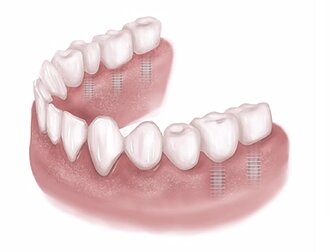
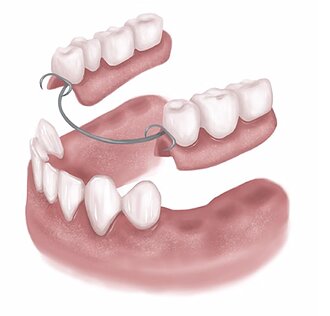
Complete Tooth Replacement
Dental implants have transformed the lives of countless patients who were missing all of their teeth in the upper or lower jaw. In fact, dental implants were originally designed specifically to address the problems patients have wearing dentures, especially the problems associated with significant bone loss and facial structure collapse over time.
Dentures have significant disadvantages, including:
- Dentures are uncomfortable and often painful.
- Dentures do not look natural, especially when eating.
- Speaking with dentures is sometimes difficult and often sounds unnatural.
- As the bone continues to melt away, dentures become loose and can fall out when laughing, sneezing, or coughing without adhesives.
- People with dentures visibly age much faster than people with natural teeth
- Dentures do not allow people to eat certain foods, such as steak or apples.
Dental implants also allow people who have major dental problems, such as multiple missing teeth, teeth that cannot be restored, or significant bone loss from partial dentures to replace all of their teeth and restore a natural-looking smile that functions properly.
There are a number of treatment options for replacing dentures or complete tooth replacement with dental implants that provide varying levels of stability, function and esthetics. The options available also offer patients choices relative to cost, from the most economical removable denture supported by a few implants, to the most esthetic fixed porcelain bridges supported by several implants in each arch,. Three of these options are illustrated below:
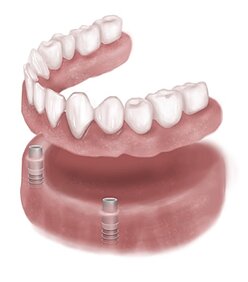
Implant retained dentures use a minimum number of dentures implants to provide support, stability and comfort.
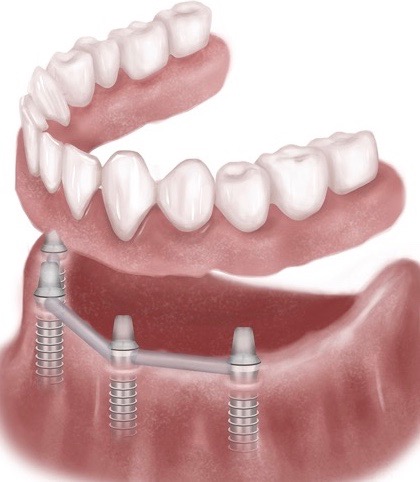
Implant bar-supported use a metal bar and additional implants to provide better stability and function.
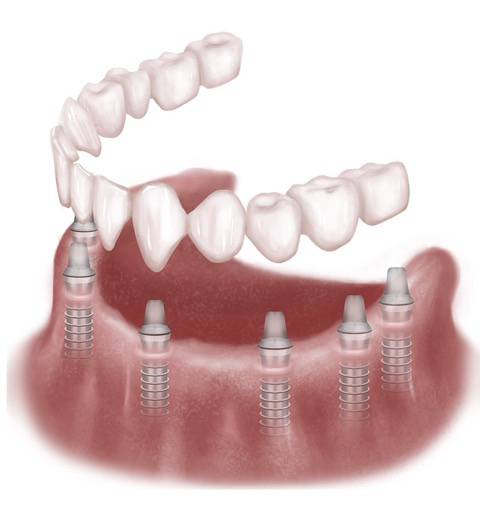
Fixed bridges supported by several implants provide superior esthetics, function and comfort.

 >
>


